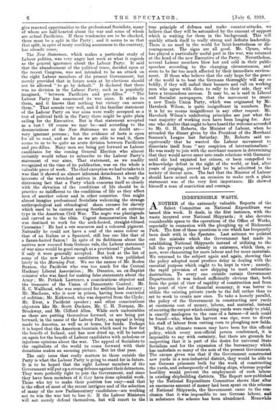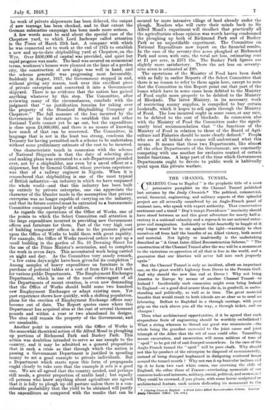INDEFENSIBLE WASTE. A NOTHER of the extremely valuable Reports of the
Select Committee on National Expenditure was issued this week. It deals, in the first instance, with the waste incurred over National Shipyards ; it also devotes considerable space to the operations of the Office of Works, especially in connexion with the ploughing up of Richmond. Park. The first of these questions is one which has frequently been dealt with in the Spectator. Last autumn we poiiited out the mistake which the Government had made in establishing National Shipyards instead of utilizing to the full the private yards already in existence, which then, as now, were clamouring for more labour and for more materials. We returned to the subject again and again, showing that the policy adopted must produce delay in dealing with the essential purpose which ought to be kept in view ; namely, the rapid provision of new shipping to meet submarine destruction. To every one outside certain Government Departments it was indeed sufficiently obvious that, both from the point of view of rapidity of construction and from the point of view of financial economy, it was better to utilize the existing private yards to the full rather than to set to work to create new ones. To take a homely parallel, the policy of the Government in constructing new yards at enormous cost of money, labour, and material, instead of securing the output which existing yards were ready to yield, is exactly analogous to the case of a farmer—if such could be found—who, when his harvest was ripe, were to divert his staff of labour from cutting corn to ploughing new fields.
What the ultimate reason may have been for this official policy, which every non-official person condemned, it is impossible to say with certainty, but there are grounds for suspecting that it is part of the desire for universal State Socialism and for the expansion of the bureaucracy which has underlain so many of the acts of the present Government. The excuse given was that if the Government constructed new yards in a non-industrial district, they would be able to use German prisoners both for the work of constructing the yards, and subsequently of building ships, whereas popular hostility would prevent the employment of such labour in existing shipbuilding districts. The Report now published by the National Expenditure Committee shows that after an enormous amount of money had been spent on this scheme of National Shipyards, the Government came to the con- clusion that it was impossible to use German labour, and in substance the scheme has been abandoned. Meanwhile he work of private shipowners has been delayed, the output A new tonnage has been checked, and to that extent the German submarine campaign has been made more serious. A few words must be said about the special case of the Chepstow yard, to which Lord Inchcape called attention in the Times of March 25th last. A company with which he was connected set to work at the end of 1915 to establish a new and up-to-date shipbuilding yard at Chepstow, on the Wye. Over £600,000 of capital was provided, and quiet but rapid progress was made. The land was secured on economical terms, workmen's houses were planned on the lines of a garden city, the construction of new ships was well in hand, and the scheme generally was progressing most favourably. Suddenly in August, 1917, the Government stepped in and, without giving any reason, took over this excellent piece of private enterprise and converted it into a Government shipyard. There is no evidence that the nation has gained anything whatever by this step. The Committee, after reviewing many of the circumstances, conclude with the judgment that " no justification remains for taking over the property of the Standard Shipbuilding Company at Chepstow." The full measure of the Ioss incurred by the Government in their attempt to establish this and other National Yards cannot yet be set out, but the expenditure is close upon £4,000,000, and there is no means of knowing how much of that can be recovered. The Committee, in language that is not in the least too strong, condemn the Treasury for having permitted such a scheme to be undertaken without some preliminary estimate of the cost to be incurred.
One characteristic touch in connexion with the scheme of National Shipyards is that the duty of selecting sites and making plans was entrusted to a sub-Department presided over, not by a shipbuilder, nor even by a naval officer or a shipowner, but by General Collard, whose previous experience was that of a railway engineer in Nigeria. When it is remembered that shipbuilding is one of the most typical of British industries—an industry in which we have surpassed the whole -world—and that this industry has been built up entirely by private enterprise, one can appreciate the character of the blunder made in the assumption that private enterprise was no longer capable of carrying on the industry, and that its future control must be entrusted to a bureaucratic Committee composed largely of soldiers.
As regards the operations of the Office of Works, one of the points to which the Select Committee call attention is the large expenditure incurred in providing new Government offices and furniture for them. Part of the very high cost of building temporary offices is due to the pressure placed upon the Office of Works to build them with great rapidity. For example, the Office of Works received orders to put up a small building in the garden of No. 10 Downing Street for the use of the Prime Minister's secretaries, and to complete the work in seven days. This necessitated work being carried on night and day. As the Committee very sanely remark, " a few extra days might have been given for its completion " Among samples of heavy expenditure on furniture is the purchase of pedestal tables at a cost of from £10 to £13 each for various public Departments. The Employment Exchanges Department, which is one of the most extravagant of all the Departments of recent creation, is even now demanding that the Office of Works should build some two hundred new Employment Exchanges or adapt existing ones. Yet past experience shows how quickly, with a shifting population, plans for the erection of Employment Exchange offices may become out of date. The Report quotes cases where this Department has acquired sites at the cost of several thousand pounds and within a year or two abandoned its designs. The sites still remain the property of the Government, and are unsaleable.
Another point in connexion with the Office of Works is the somewhat theatrical action of Sir Alfred Mond in ploughing up portions of Richmond Park and Bushey Park. This action was doubtless intended to serve as tine sample to the country, and it may be admitted as a general proposition that in such a crisis as that through which the nation is passing a Government Department is justified in spending money to set a good example to private individuals. But a Department which starts upon this form of propaganda ought clearly to take care that the example it sets is a good one. We are all agreed that the country needed, and perhaps still needs, a greater proportion of arable land ; but equally all persons who know anything about agriculture are agreed that it is folly to plough up old pasture unless there is a con- siderable probability that the yield to be obtained will justify the expenditure as compared with the results that can be secured by more intensive tillage of land already wider the plough. Readers who will carry their minds back to Sir Alfred Mond's experiment will recollect that practically all the agriculturists whose opinion was worth having condemned the ploughing up both of Richmond Park and of Bushey Park as an unjustifiable experiment. The Committee on National Expenditure now report on the financial results. hi the case of the seventy-five acres ploughed at Richmond Park and sown with oats, the total net -loss, estimating rent at £1 per acre, is £571 15s. The Bushey Park figures are slightly more satisfactory. There the net loss on seventy- nine acres is estimated at £90.
The operations of the Ministry of Food have been dealt with so fully in earlier Reports of the Select Committee that there is no reason to refer to them again here, except to note that the Committee in this Report point out that part of the losses which have in some cases been debited to the Ministry of Food ought more properly to be debited to the Ministry of Blockade. The latter Ministry, in its necessary work of restricting enemy supplies, is compelled to buy certain foodstuffs, which it hopes to sell again through the Ministry of Food. The loss incurred ought in some cases, at any rate, to be debited to the cost of blockade. In connexion also with the Ministry of Food the Committee make the signifi- cantly brief recommendation that " the functions of the Ministry of Food in relation to those of the Board of Agri- culture and Fisheries should be more clearly defined." People who are at all behind the scenes will understand what this means. It means that these two Departments, like almost all the other Departments of the Government, are constantly competing with one another for exclusive control of certain border functions. A large part of the time which Government Departments ought to devote to public work is habitually spent upon this private warfare.











































 Previous page
Previous page